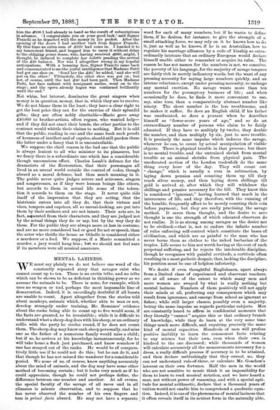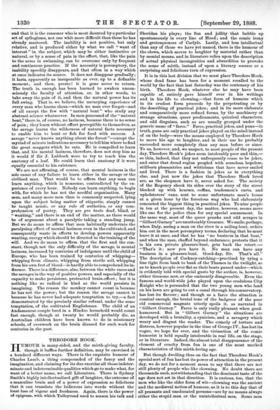MENTAL LAZINESS.
WE must say plainly we do not believe one word of the constantly repeated story that savages exist who cannot count up to ten. There is no cretin tribe, and no tribe which can be shown to be as deficient in thinking-power as we assume the animals to be. There is none, for example, which uses no weapon or tool, perhaps the most impassable line of demarcation. Indeed, it is exceedingly doubtful if all beasts are unable to count. Apart altogether from the stories told about monkeys, animals which, whether akin to man or not, develop strangely under training, Mr. Romanes' evidence about the rooks being able to count up to five would seem, if the facts are granted, to be irresistible ; while it is difficult to understand what a sheep-dog does with his sheep, or an ordinary collie with the party he circles round, if he does not count them. The sheep-dog may know each sheep personally, and miss one as the father of a numerous family would miss a child; but if so, he arrives at his knowledge instantaneously, for he will take home a flock just purchased, and know somehow if one has strayed out of the ranks. He would be of compara- tively little use if he could not do this; but he can do it, and that though he has not missed the wanderer for a considerable period. We none of us, of course, know anything accurately about the mind of animals, and the dog may have some other method of becoming certain ; but it looks very much as if he could appreciate, though he could not perhaps define, the
difference between one number and another. At all events, the special faculty of the savage of all races and in all
climates is minute observation, and to suppose that he has never observed the number of his own fingers and toes is prima facie absurd. He may not have a separate word 'for each of many numbers, but if he wants to define them, if he desires, for instance, to give the strength of a small attacking force, we may rely on it he knows how to do it, just as well as he .knows, if he is an Australian, how to regulate his marriage alliances by a code of kinship so extra- ordinarily intricate that an ordinary European would declare himself unable either to remember or acquire its rules. The reason he has not names .for the numbers is not, we conceive, the poverty of his language for the majority of savage tongues are fairly rich in merely indicatory words, but the want of, any pressing necessity for saying large numbers quickly, and an intense reluctance, except under pressing necessity, to undergo any mental exertion. No savage wants more than ten numbers for the peremptory business of life; and when occasionally he does, he finds it more convenient to use, say, nine tens, than a comparatively abstract number like ninety. The short number is the less troublesome, and he makes it suffice. So does an English child, if his father was uneducated, so does a peasant when he describes himself as "tower-score years of age," and so do an extraordinary number of persons who claim to be fairly educated. If they have to multiply by twelve, they double the number, and then multiply by six, just to save trouble. It is precisely the same impulse which induces the savage, whenever he can, to count by actual manipulation of visible objects. There is physical trouble in that process; but there is no mental trouble, and the untrained shrink from mental trouble as an animal shrinks from physical pain. The uneducated section of the London tradesfolk do the same thing every hour of the day. They will count out " change," which is usually a sum in subtraction, by laying down pennies and counting them up till they reach silver money, and then laying down shillings till gold is arrived at, after which they will withdraw the shillings and pennies necessary for the bill. They know this is considered " ignorant," having learned that much in the intercourse of life, and they therefore, with the cunning of the humble, frequently affect, to be merely counting their coin before payment; but they are really practising the savage method. It saves them thought, and the desire to save thought is one the strength of which educated observers do not realise. It is as strong among savages as the desire not to be civilised,—that is, not to endure the infinite number of rules enforcing self-control which constitute the bases of civilisation, and which are as painful to the man who has never borne them as clothes to the naked barbarian of the tropics. Life seems to him not worth having at the cost of such perpetual suffering, and he rejects the intolerable discipline, though he recognises with painful certitude, a certitude often resulting in a most pathetic despair, that, lacking the discipline, his position must be one of helpless inferiority.
We doubt if even thoughtful Englishmen, apart always from a limited class of experienced and observant teachers, are at all aware of the extent to which many men and more women are swayed by what is really nothing but mental laziness. Numbers of them positively will not apply their minds at all, preferring any consequences which may result from ignorance, and emerge from school as ignorant as fishes ; while still larger classes, possibly even a majority, betray the same impulse as regards particular subjects. Men are constantly heard to affirm in confidential moments that they literally " cannot" acquire this or that ordinary branch of knowledge, while they do learn at the very same time things much more difficult, and requiring precisely the same kind of mental capacities. Hundreds of men will profess positive inability to learn the commonest facts relating to any science but their own, even when their own is kindred to the one discussed; while thousands of women will calculate accurately all the measurements necessary for a dress, a really difficult process if accuracy is to be attained, and then declare unblushingly that they cannot, no, they can not understand rule-of-three, or calculate Mr. Goschen's interest on their own fortunes. Half the men in the world who are not sensitive to music think it an impossibility for them to learn to read musical notation, and we have heard a man, not without power of reasoning, and with a special apti- tude for mental arithmetic, declare that a thousand years of tuition would not enable him to comprehend a quadratic equa- tion. Indeed, it is one of the phenomena of mental laziness that it often reveals itself in its acutest form in the naturally able,
and that it is the reasoner who is most daunted by a particular set of syllogisms, not one whit more difficult than those he has already mastered. The inability is not positive, but only relative, and is produced either by what we call " want of interest" in the subject, which may be either instinctive or natural, or by a sense of pain in the effort, that, like the pain to the arms in swimming, can be overcome only by frequent and continuous practice. If the necessity is peremptory, the inability speedily disappears, and that often in a way which at once indicates its source. It does not disappear gradually; it lasts, apparently as insuperable as ever, up to a definable moment; and then, presto it is gone never to return. The truth is, enough has been learned to awaken uncon- soionaly the faculty of attention, or, in other words, to take away the pain of it, and then the natural power has its full swing. That is, we believe, the unvarying experience of every man who learns chess—which no man ever forgot—and of all except the few with " natural bent " who study any abstract science whatsoever. In men possessed of the " natural bent," there is, of course, no laziness, because there is no sense of pain ; they learn without effort perceptible to themselves, as the savage learns the wilderness of natural facts necessary to enable him to hunt or fish for food with success. A savage "never knows anything about the forest "—except the myriad of minute indications necessary to tell him where to find the great maggots which he eats. He is compelled to learn that, and his mental laziness, therefore, does not stop him as it would if Sir J. Lubbock were to try to teach him the anatomy of a leaf. He could learn that anatomy if it were equally essential to his existence.
We are not affirming, of course, that mental laziness is the sole cause of any failure to learn either in the savage or the civilised man. That would be to affirm that any man can learn anything, which is nonsense, contradicted by the ex- perience of every hour. Nobody can learn anything, to begin with, for which he has not the needful organisation. Many men, and many more men than is commonly suspected, lying upon the subject being matter of etiquette, simply cannot be taught music, or any rule of Eesthetics, or any com- prehension of poetry. They are pro tents deaf, blind, or "wanting," and there is an end of the matter, as there would be of argument about a paralytic taking a standing jump. But we do mean to affirm that men habitually underrate the paralysing effect of mental laziness even in the cultivated, and consequently waste in efforts to develop powers apparently wanting, energy which should be directed to the training of the will. And we do mean to affirm that the first and the con- stant, though not the only difficulty of the savage, is mental laziness, increased by centuries of indulgence until the child of Europe, who has been trained by centuries of whipping— whipping from climate, whipping from sterile soil, whipping from his own fret of blood—is hardly able to comprehend its in- fluence. There is a difference, also, between the white races and the savages in the way of positive powers, and especially of the capacity to make persistent, protracted brain-effort ; but it is nothing like so radical in kind as the world persists in imagining. The reason the monkey cannot count is because he has not the power; but the reason the savage cannot is because he has never had adequate temptation to try,—a fact demonstrated by the precisely similar refusal, under the same temptation, of the cultivated Englishman. The child of an Andamanese couple bred in a Hindoo household would count fast enough, though at twenty he would probably die, as Australian children have been known to do in missionary schools, of overwork on the brain disused for such work for centuries in the past.







































 Previous page
Previous page